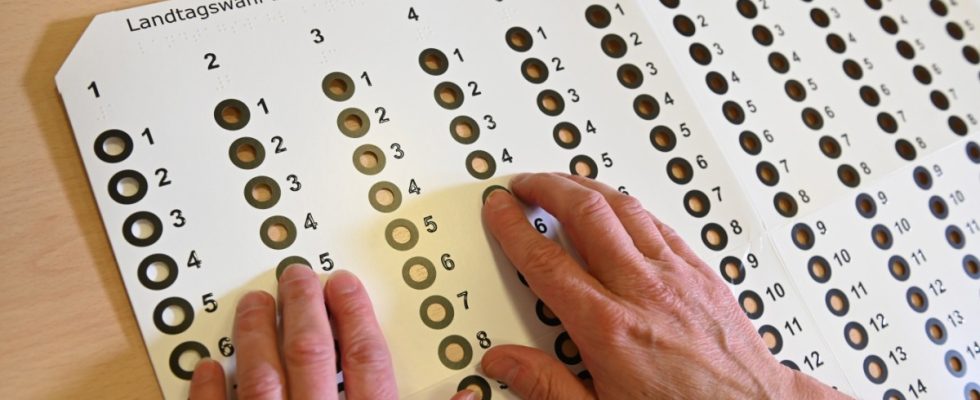The elections to the Bavarian state parliament must be general, equal, direct and secret – this is what the electoral principles stipulate. But what if people are blind and cannot fill out the ballot without an assistant?
For this reason, there have been special voting templates since 1998, which blind people and people with limited vision can use to vote independently. What has long been possible in federal, European or local elections has not yet been implemented in the Bavarian state elections. The reason: the often oversized ballot papers – in Upper Bavaria there are more than 60 candidates on paper for this year’s election – have not yet been converted into templates suitable for the blind. So far, blind people in Bavaria have therefore had to rely on the help of an assistant in the voting booth. According to the Bavarian State Office for Statistics, these assistants are obliged to provide the voter with purely “technical” assistance for individual activities and to keep the election result secret.
“Blind people also have the right to a secret and independent vote,” says the team leader of the Advice, Information and Text Service Center (BIT) of the Bavarian Federation of the Blind and Visually Impaired (BBSB), Robert Müller. Therefore, together with his colleagues at the BIT, he initiated a pilot project to find a suitable tool. They worked on a possibility for almost a year and a half.
The result of the “creative process”, as Müller describes the work of the past few months, is a cardboard template into which the ballot paper is inserted. The construction enables a secret and independent election from home or directly at the polling station. The template has round cut-outs above the checkboxes that blind people can feel with their fingers. The candidates to be elected are numbered according to party affiliation and list position and can thus be assigned to a hole in the template.
A CD, which can be listened to at home beforehand, is used to prepare for the election process. It gives instructions on how to insert and fold the template correctly. She also names the number combinations of the candidates. With the help of this, blind people then vote at home by post in the appropriate place. Alternatively, they remember the number combination of their favorite and tick the corresponding box in the polling station. A poll worker may also assist in placing the ballots in the template. Four blind people from Munich recently tested the voting aid with placebo ballots.
Gregor Cordes is one of the test persons who were able to test the new templates – for the first and second vote – with placebo ballots.
(Photo: Stephan Rumpf)
“It’s a little fiddling, but somehow it was fun. A bit like sinking ships,” Bernhard Claus describes the election process. Gregor Cordes also supports the project. “Ever since there have been election templates, I’ve been using them actively. Hopefully soon in the state elections too.” The idea of casting your own vote without an assistant in the polling station also pleases Gabi Roßmaier. “That’s why I’m here, I just like the template.”
In the October 8 election, however, the template will only be used in Middle Franconia. “There we have a manageable number of candidates and a high demand from blind people,” explains Müller. There are about 2500 to 3000 blind people who could use the template. For a corresponding construction for Upper Bavaria, where traditionally a particularly large number of candidates have to be elected, he still has to come up with something. The Bavarian State Office for Statistics welcomes the project “in a special way”. The goal is to use the templates in future state elections in other constituencies.

